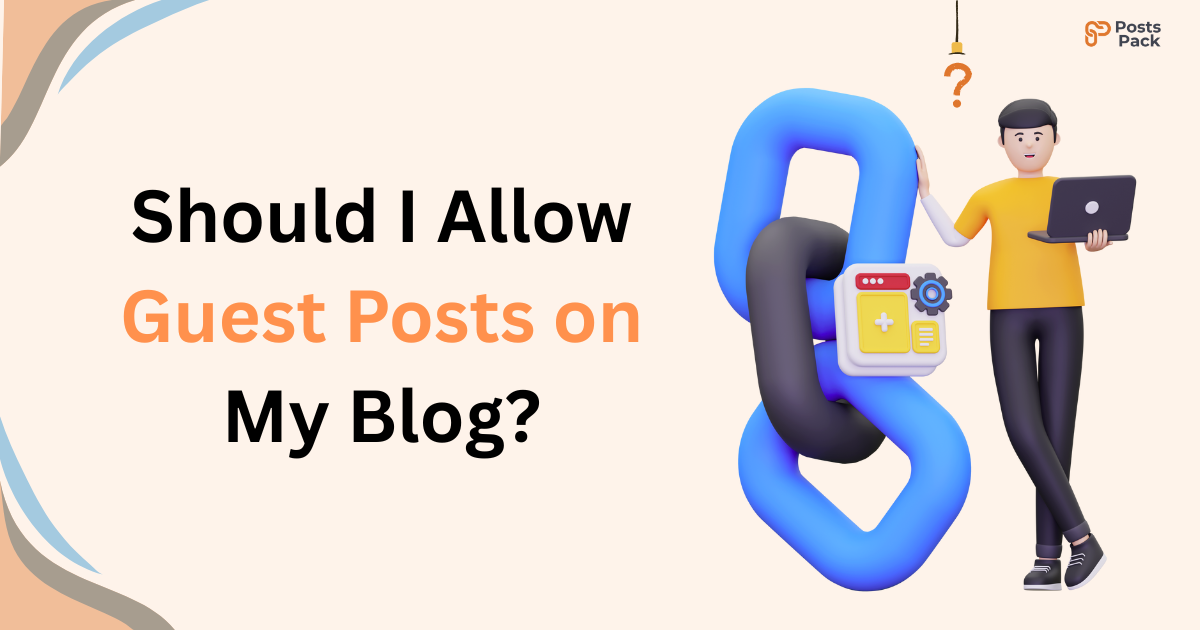Guest posting is one of the most discussed topics in blogging and SEO. If you are running a blog, you may be asking: Should I allow guest posts on my blog? The answer depends on your goals, your audience, and your content strategy. Guest posts can be a strong tool for growth but they also come with risks if not managed well.
This article will explain the benefits, risks, and best practices of accepting guest posts. You will also see how guest posting impacts SEO, traffic, and authority. You will have a clear idea of whether guest posts are right for your blog by the end.
What Is a Guest Post?

A guest post is an article written by someone who does not own your blog. That person is called a guest author. You give space on your blog, and they share their ideas, tips, or stories.
Example:
- A travel blogger may invite another writer to share budget travel tips.
- A health blog may allow a doctor to write about stress management.
Guest posts are common in blogging and SEO because they give value to both sides:
- The blog owner gets new content.
- The writer gets exposure, backlinks, and authority.
Why Do Bloggers Allow Guest Posts?
Bloggers accept guest posts for many reasons. Here are the most common:
- More content without extra work – Guest authors help you publish more often.
- Fresh ideas – New voices bring new topics and perspectives.
- SEO benefits – Guest authors usually share links back to your blog.
- Networking – It helps to build you a connect with other writers, businesses and brands.
- Extra traffic – Guest authors share their published articles with their own audience, sending visitors to your blog.
According to HubSpot, websites with blogs get 55% more visitors. Guest posts add to this traffic because more people discover your site.
The SEO Side of Guest Posts

SEO (Search Engine Optimization) is one of the biggest reasons bloggers allow guest posts.
Here’s how guest posts can help SEO:
- More content → more chances to rank for new keywords.
- Backlinks → guest authors may link from their site to yours.
- Authority → publishing expert content builds niche authority.
- Engagement → more diverse content keeps readers on your blog longer.
But SEO also has risks:
- If guest posts contain spammy links, Google may penalize your site.
- If posts are low quality, your blog authority can drop.
So, guest posts can help SEO only if you set clear rules and check quality carefully.
Want to understand how to find quality guest posting opportunities?
Check out our detailed guide on
Guest Post Placements to identify the best blogs that truly boost SEO.
Risks of Allowing Guest Posts
Let’s be honest: guest posts are not always safe. Here are the risks:
- Low-quality writing – Some guest writers only want a backlink, not to give value.
- Too many links – If a guest post is filled with links, it looks spammy.
- Off-brand content – A post may not match your blog’s style or voice.
- Editing work – You may spend hours fixing grammar, tone, and SEO.
- Google penalty – If your site becomes full of weak guest posts, rankings may fall.
Should I Allow Guest Posts On My Blog? (Different Perspectives)

Here’s how different types of bloggers and site owners should think:
1. For Small Bloggers
- Pros: Guest posts can grow your blog faster because you get more content.
- Cons: Harder to attract quality writers at first. You may get lots of spam pitches.
2. For Large Blogs
- Pros: Easier to attract experts who want exposure on your big platform.
- Cons: You need a strict editorial team to filter posts.
3. For Business Blogs
- Pros: Guest posts can bring fresh case studies, industry tips, and brand partnerships.
- Cons: Too many outside voices may weaken your brand message.
4. For Personal Blogs
- Pros: You can feature friends, colleagues, or niche experts.
- Cons: Readers may want your personal stories, not guest content.
Best Practices If You Accept Guest Posts
If you decide to allow guest posts, follow these simple rules:
1. Create Clear Guidelines
Make a “Write for Us” page. Tell writers:
- Word count (e.g., 1200+ words).
- No copy-paste or plagiarized text.
- Only 1–2 backlinks are allowed.
- Must be original, helpful, and well-written.
2. Review Every Post
Check for:
- Grammar and spelling.
- Natural keyword use.
- Relevance to your audience.
3. Keep Editorial Control
You are the blog owner. Always edit guest posts to match your tone and SEO plan.
4. Use Author Bios
Add a short bio at the end of each guest post. Example:
“Written by John Doe, digital marketer and SEO strategist.”
5. Balance Guest and Own Content
Don’t let guest posts take over. Readers should still see your voice often.
Guest Posts vs Sponsored Posts

Many bloggers confuse guest posts with sponsored posts. Here’s the difference:
| Factor | Guest Post | Sponsored Post |
| Cost | Free | Paid by brand |
| Purpose | Share knowledge, build authority | Promote a product or service |
| SEO Risk | Low (if quality) | High (if full of ads/links) |
| Example | “5 SEO Tips” by guest author | “Best VPN 2025” by a sponsor |
Use guest posts for authority and variety. Use sponsored posts for revenue.
Real-World Examples
- Moz Blog accepts guest writers for SEO topics.
- Entrepreneur has many expert contributors.
- Medium is fully built on external writers.
This shows that guest posting works, but only with clear quality checks.
People Also Ask
Q1. What if a guest post is low quality?
You should reject it or ask the writer to improve it.
Q2. What if the guest post does not match my blog topic?
Do not publish it. Only accept posts that fit your niche.
Q3. Can too many guest posts change my blog’s voice?
Yes, if you publish too many, readers may miss your own style.
Q4. What if guest writers add too many links?
Remove extra links and only allow the ones that make sense.
Q5. Should i allow guest posts on my blog that harm my blog’s reputation?
No, if they are poorly written or share wrong information.
Q6. What if I get copied or duplicate content?
Do not accept it. Always check if the content is original.
Q7. Can guest posts take too much of my time?
Yes, editing and checking guest posts can be time-consuming.
Q8. What if readers do not trust guest writers?
Add a short bio to show the writer’s background and expertise.
Q9. Can guest posts cause fights over ownership?
Yes, if you do not set clear rules. Always say the post belongs to your blog once published.
Q10. What if guest writers stop sending good content?
You should not rely only on them. Keep writing your own posts too.
Conclusion
If you’re still thinking, should i allow guest posts on my blog? The answer depends on your concerns. If you want more content, networking, and SEO growth, then yes—allow guest posts. On the other hand if you want full control and no risk of spam, then no—write only your own posts. The safest way is to allow guest posts with strict rules. That way, you enjoy the benefits without harming your blog.
Don’t hesitate to get more information about growing even faster with high-quality backlinks, explore Postspack’s link building services.





